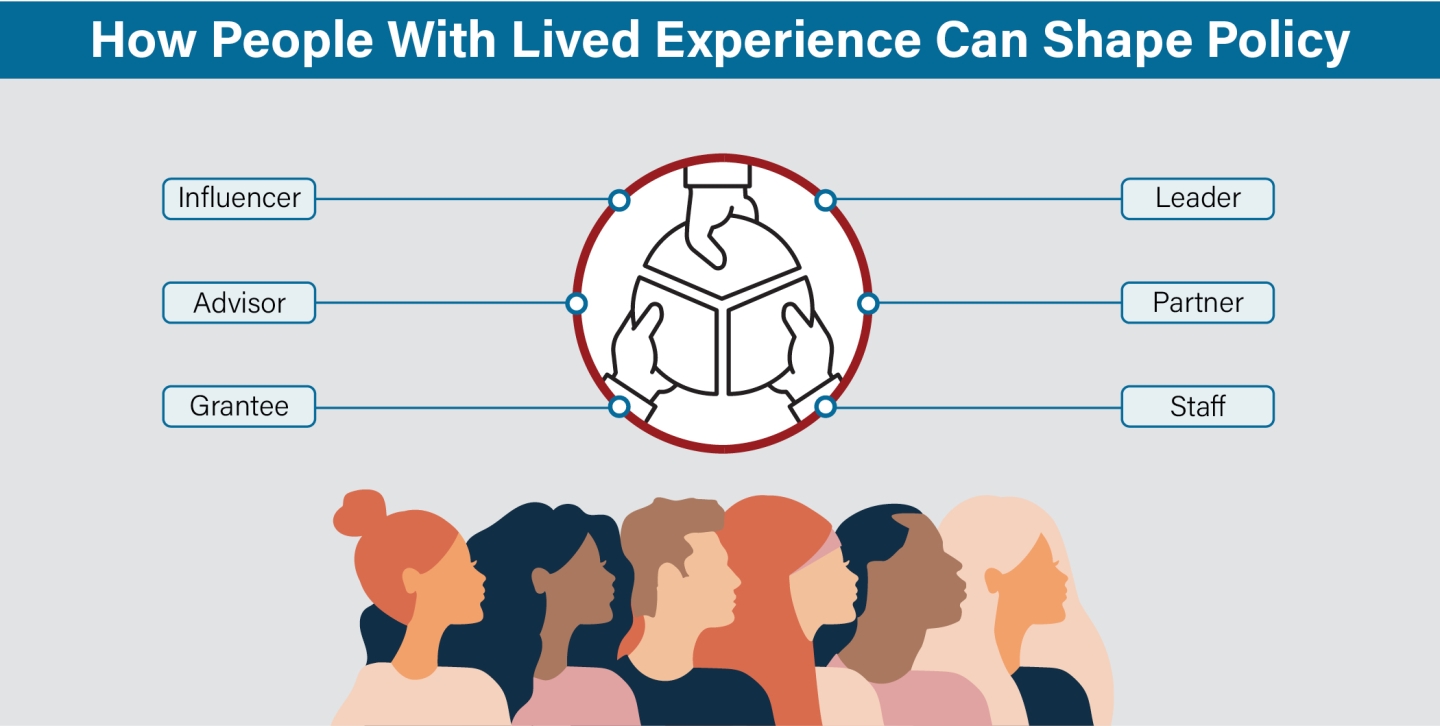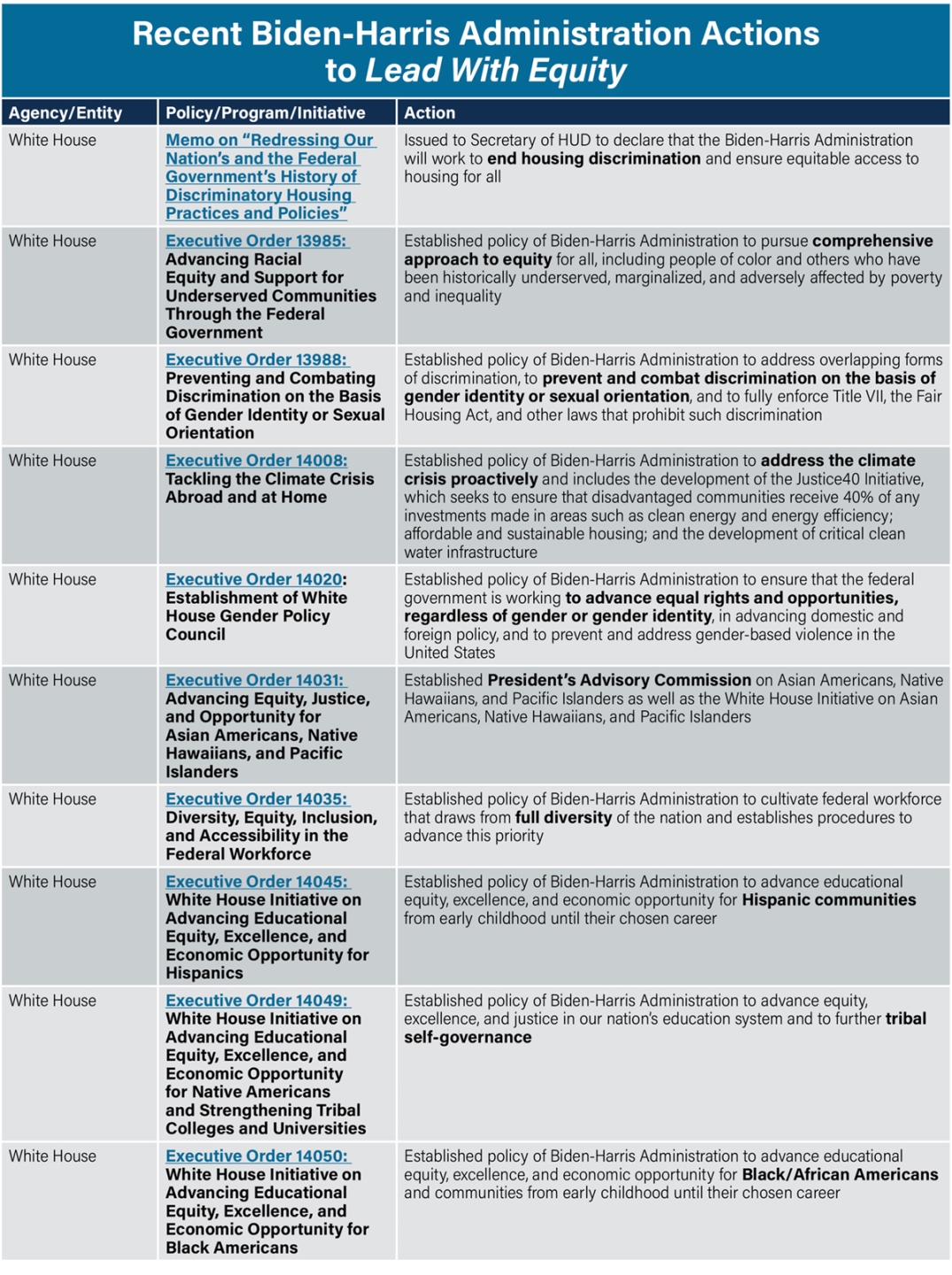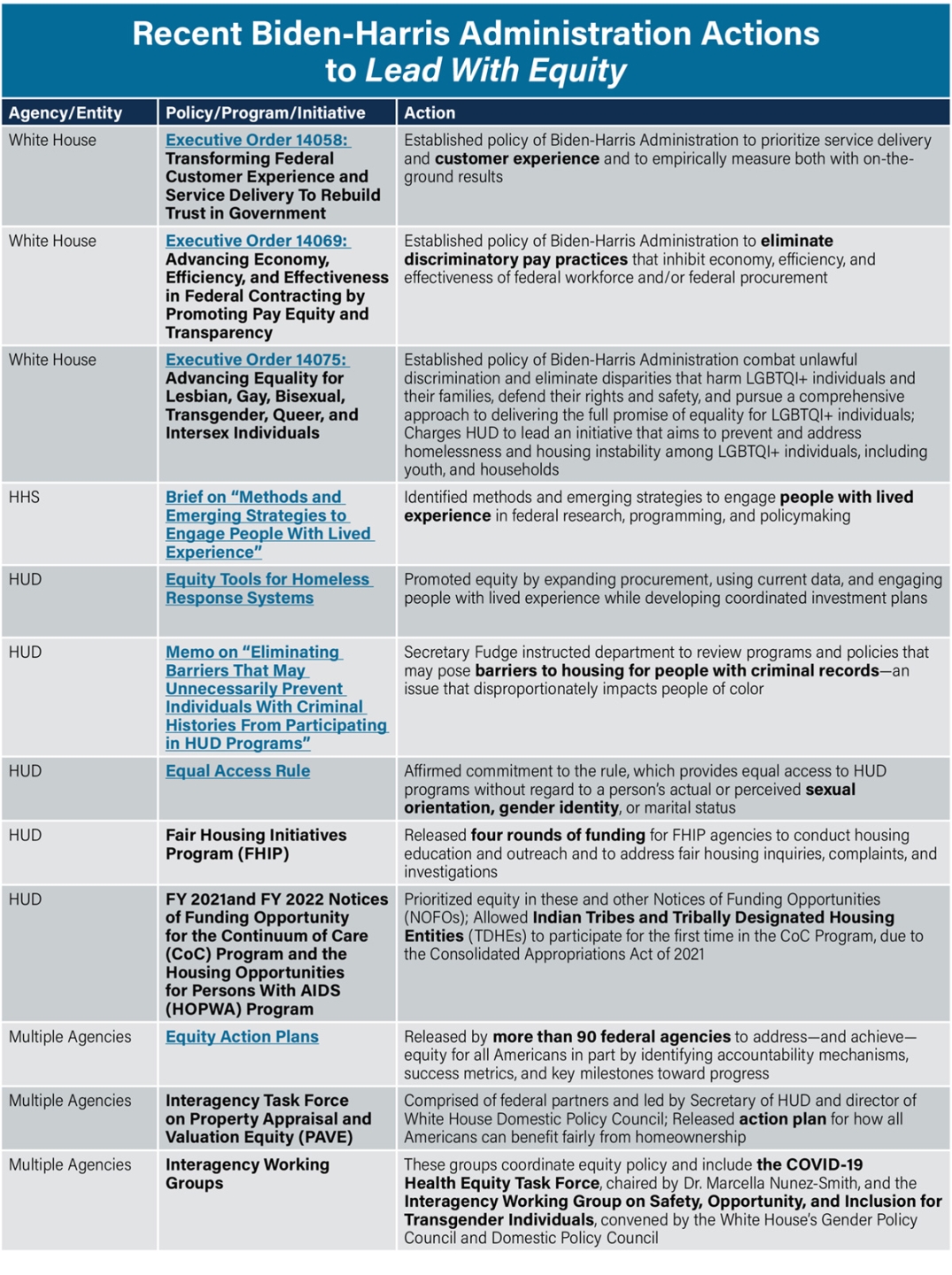Lead With Equity
This is an excerpt of All In: The Federal Strategic Plan to Prevent and End Homelessness. Read the full plan at usich.gov/all-in.
All In serves as a roadmap for federal action to ensure state and local communities have sufficient resources and guidance to build the effective, lasting systems required to end homelessness. While it is a federal plan, local communities can use it to collaboratively develop local and systems-level plans for preventing and ending homelessness. This plan creates an initial framework for meeting the ambitious goal of reducing overall homelessness by 25% by 2025 and sets the United States on a path to end homelessness.
This plan is built around six pillars: three foundations—equity, evidence, and collaboration—and three solutions—housing and supports, homelessness response, and prevention—all of which are required to prevent and end homelessness. Within each pillar of foundations and solutions are strategies that the federal government will pursue to facilitate increased access to housing, economic security, health, and stability. Some agency commitments, cross-government initiatives, and efforts are already underway and are highlighted throughout.
Upon release of this plan, USICH will immediately begin to develop implementation plans that will identify specific actions, milestones, and metrics for operationalizing the strategies in close partnership with its member agencies and other stakeholders representing a broad range of groups and perspectives, including people with lived experience. For more on this, please view the Framework for Implementation.
Strategies to Lead With Equity
Discrimination in housing, education, employment, criminal justice, and health care have led to inequitable access to wealth and economic opportunity and to a greater likelihood of experiencing homelessness. To acknowledge and address these and other inequities, the following strategies and actions are intended to ensure that the solutions in this plan will be designed and implemented equitably.
Strategy 1: Ensure federal efforts to prevent and end homelessness promote equity and equitable outcomes.
In recent years, the homelessness sector has increasingly focused on equity and inclusivity. To achieve equity, we must build off the work already underway through President Biden’s Executive Order on “Advancing Racial Equity and Support for Underserved Communities Through the Federal Government” and take additional steps to affirmatively advance equity, civil rights, racial justice, and equal opportunity.
To accomplish this strategy, USICH and relevant member agencies will:
- Identify expected equity outcomes with qualitative and quantitative measures and plans for how programs and agencies responsible for carrying out strategies and actions included in this plan will collect and report on the information used to measure these outcomes.
- Establish tools and processes for identifying, analyzing and updating agency-specific policies, practices, and procedures for programs and agencies responsible for carrying out strategies and actions included in this plan that may inhibit opportunity to advance and promote equity.
- Create a mechanism to publicly report federal actions taken by USICH and its member agencies to advance equity and support local and state efforts to address disparities.
- Provide messaging and guidance to state and local stakeholders about promising practices that are having a measurable impact on disparities.
- Ensure all guidance, tools, and websites are designed to be accessible and to ensure effective communication for people with disabilities; and take steps to ensure meaningful access for people with limited English proficiency.
- Create learning opportunities across USICH and its member agencies on racial equity, cultural competence, cultural humility, and disability competence.
- Hire people and partner organizations with a strong equity analysis to inform actions taken under this strategy.
Strategy 2: Promote inclusive decision-making and authentic collaboration.
It is critical that people who have experienced or who are experiencing homelessness and housing instability lead and participate in the development and implementation of policies and programs. This includes not only people of color but other historically marginalized groups that are overrepresented in homeless populations, especially people identifying as LGBTQI+ and people with disabilities.
To accomplish this strategy, USICH and relevant member agencies will:
- Identify existing federal advisory groups, committees, and workgroups that are focused on preventing and ending homelessness and seek ways to expand membership to include people with lived experience and for ensuring meaningful participation and compensation for their time and expertise.
- Review federal processes and administrative requirements for contractors that deliver relevant technical assistance (TA) and capacity-building related to implementation of the strategies within this plan to allow for an expanded pool of selected contractors and firms with higher diversity of staff and management and/or people with lived experience.
- Identify ways to conduct accessible outreach to and hire people with lived experience in federal job announcements for programs and agencies responsible for carrying out strategies and actions included in this plan.
- Allow for and incentivize inclusive processes that allow for meaningful engagement in all federal funding grants that directly impact people at risk of or experiencing homelessness.
- Create flexibilities in existing federal programs to encourage funding recipients that serve people at risk of or experiencing homelessness to hire people with lived experience and compensate them on par with other staff.
- Create flexibilities in existing federal programs to allow recipients to use program funds to compensate people with lived experience participating on local advisory councils.
- Examine barriers such as federal program caps on earned income and explore opportunities to provide flexibilities for people with lived experience to be compensated for their participation in planning activities and input processes without risking any benefits or assistance that they receive from the federal government.
- Incentivize, strengthen, and expand opportunities for professional development and mentoring focused on supporting people with lived experience as they take on new types of roles, especially leadership roles.
- Create learning opportunities across USICH and its member agencies on creating environments that will allow people with lived experience to thrive and not be retraumatized.
Strategy 3: Increase access to federal housing and homelessness funding for American Indian and Alaska Native communities living on and off tribal lands.
Although tribes have exercised inherent sovereignty over their lands, AI/AN communities continue to face unique challenges today—including federal disinvestment in basic infrastructure, severe housing shortages that lead to dangerous overcrowding, and complex legal constraints related to land ownership. These challenges make it extremely difficult to improve housing conditions. Solutions to these challenges must be developed and designed through consultation and in partnership with tribes and must be culturally appropriate and adaptive to the unique circumstances of AI/AN communities living on and off tribal lands.
To accomplish this strategy, USICH and relevant member agencies will:
- In accordance with Executive Order 13175 and the Presidential Memorandum on Tribal Consultation and Strengthening Nation-to-Nation Relationships, build upon the tribal consultation that took place to inform the development of this plan and further consult tribes on strategies and solutions that will impact housing instability and homelessness for American Indian and Alaska Native communities living on and off tribal lands.
- Explore opportunities to expand Native American Housing Assistance and Self-Determination Act programs (the primary vehicle for developing housing in tribal land).
- Promote and expand opportunities to hire more AI/AN people across agencies responsible for carrying out strategies and actions included in this plan.
- Coordinate a federal TA strategy to support efforts of tribes and Native-serving organizations operating off tribal land to address homelessness and increase access to funding streams that are newly available to tribes.
Strategy 4: Examine federal policies and practices that may have created and perpetuated racial and other disparities among people at risk of or experiencing homelessness.
Policies and practices that may be intended to promote racial neutrality sometimes inadvertently led to worse housing outcomes for people of color. Our collective response to homelessness should advance policies and practices specifically designed to eliminate racial inequities in homelessness and housing.
To accomplish this strategy, USICH and relevant member agencies will:
- Partner with the agencies responsible for carrying out the strategies and actions within this plan and review policies and regulations associated with the federal programs and initiatives to assess whether and how current policies and programs may perpetuate racial disparities or create barriers for marginalized groups and people of color and identify achievable policy and program changes to advance equity.
- Develop tools and provide direct TA to help grantees, states, local governments, and U.S. territories to implement equitable policies and practices and build the capacity of organizations to serve people of color and marginalized groups who face current and historic discrimination based on race, disability, class, and gender identity.
- Highlight communities that achieve reductions in racial and other disparities, and create tools, products, and guidance based on their strategies.





